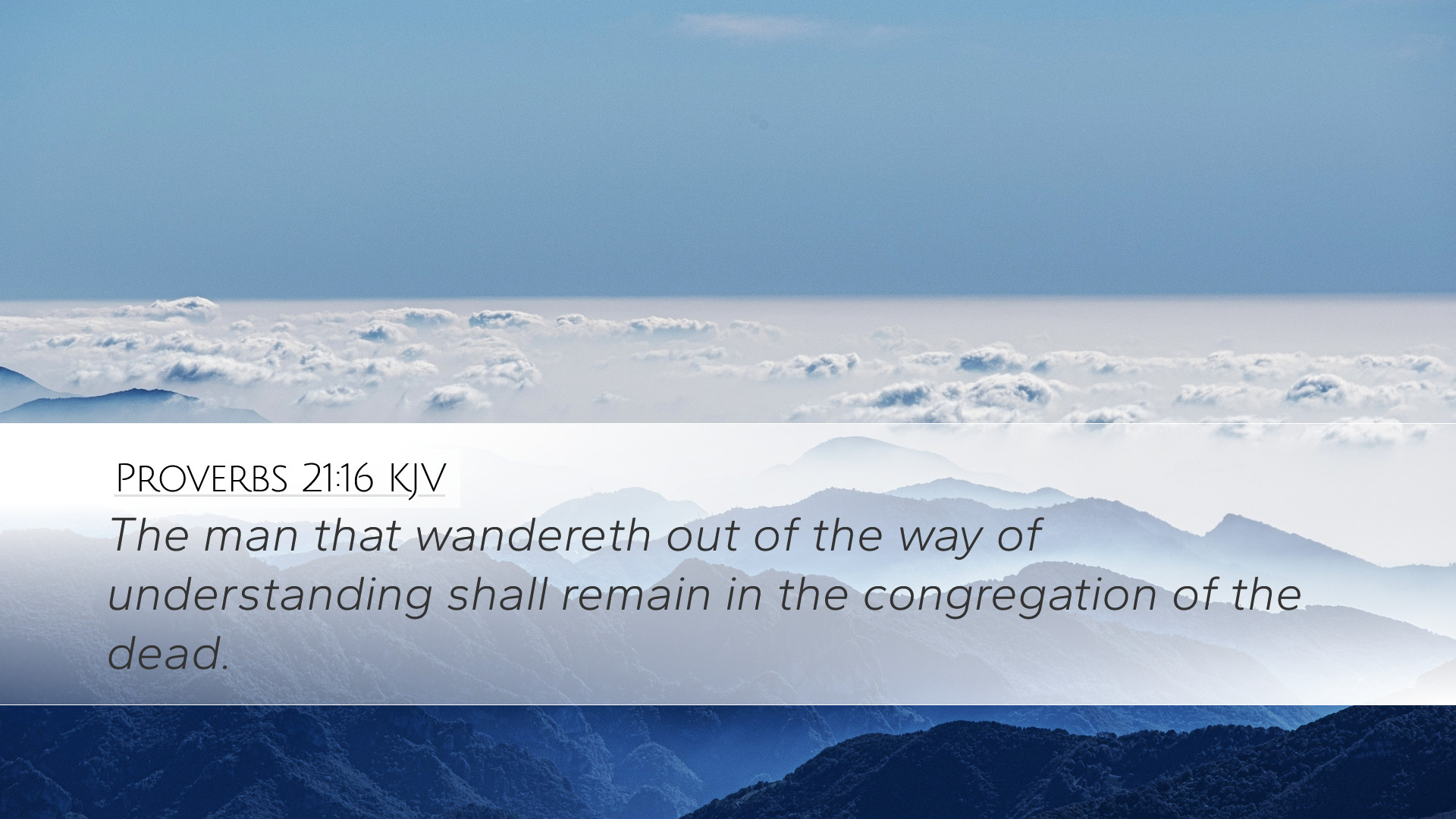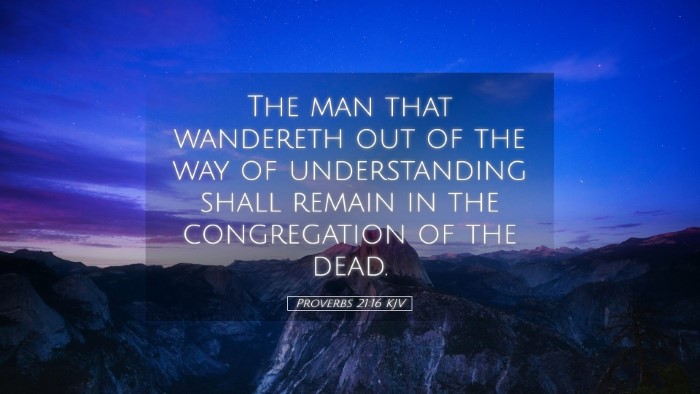Commentary on Proverbs 21:16
Proverbs 21:16 states, "The man who wanders from the way of understanding will rest in the assembly of the dead." This verse offers a profound insight into the consequences of deviating from wisdom and understanding.
General Overview
This verse serves as a stark warning about the fate of those who neglect the path of righteousness and wisdom. The metaphor of "wandering" suggests a willful straying from the truth, indicating a lack of commitment to understanding God's ways. In this commentary, we explore the depths of this verse as gleaned from the insights of Matthew Henry, Albert Barnes, and Adam Clarke.
Matthew Henry's Insight
Matthew Henry articulates that to wander from the way of understanding is to depart from the teachings of Scripture and the guidance of God. He emphasizes that true wisdom is found in the fear of the Lord, and failure to adhere to this path can lead to desolation. Henry notes:
- Spiritual Deadness: The 'assembly of the dead' symbolizes not just physical death, but a spiritual state marked by separation from God and the life He offers.
- Consequences of Straying: Henry warns that those who forsake wisdom will find themselves in the company of the spiritually misguided, which ultimately leads to destruction.
Albert Barnes' Contributions
Albert Barnes provides an analysis suggesting that wandering from understanding brings about inevitable consequences. According to Barnes:
- Path of Destruction: The idea of 'wandering' portrays a lack of direction, leading individuals away from the path that leads to life.
- Unrighteous Company: The term 'assembly of the dead' refers to both literal death and fellowship with those who are spiritually lifeless, highlighting the notion that bad company corrupts good character.
He further elaborates that the wise understand the importance of remaining steadfast in their pursuit of understanding and knowledge.
Adam Clarke's Perspective
Adam Clarke, in his analysis, focuses on the Hebrew terminology and its implications. He notes:
- Understanding as a Path: The 'way of understanding' is a deliberate and chosen pathway, emphasizing the necessity of conscious decision-making in one’s spiritual journey.
- Finality of the Wages of Sin: Clarke interprets the assembly of the dead as a final resting place for those who do not heed the call to wisdom, portraying it as a grave consequence of a life poorly lived.
He highlights the gravity of the statement and encourages believers to diligently pursue knowledge as a safeguard against spiritual demise.
Theological Implications
This verse carries rich theological implications concerning sin, wisdom, and community:
- Sin and its Consequences: The wandering from understanding signifies a spiritual rebellion that leads not only to personal ruin but also to the potential of leading others astray.
- Importance of Community: Proverbs teaches that one's path affects the community; thus, the verse serves as a caution to maintain fellowship with wise and understanding individuals to avoid spiritual death.
- The Nature of Wisdom: This passage reaffirms the biblical motif that wisdom and understanding are paramount to a fulfilling life, directly linking one's spiritual journey to the outcomes of their decisions.
Practical Applications
From this verse, several practical applications emerge for pastors, students, and theologians:
- Encouragement to Seek Wisdom: Believers are encouraged to intentionally pursue wisdom through prayer, study, and community.
- Evaluating Influences: Pastors are urged to guide their congregations in evaluating the influences they allow in their lives.
- Community Engagement: The necessity of surrounding oneself with individuals who uplift and challenge towards growth in faith is paramount.
Conclusion
Proverbs 21:16 serves as a cautionary tale regarding the spiritual perils of wandering from the pathway of wisdom. It encapsulates a robust theological principle that resonates across the spectrum of Christian thought. The insights from Henry, Barnes, and Clarke illuminate the multi-faceted nature of this verse, pushing believers towards a life characterized by the pursuit of understanding. Ultimately, this verse is a call to arms for the church to safeguard their paths and ensure their fellowship is rooted in leaders who abide by the wisdom of God.


